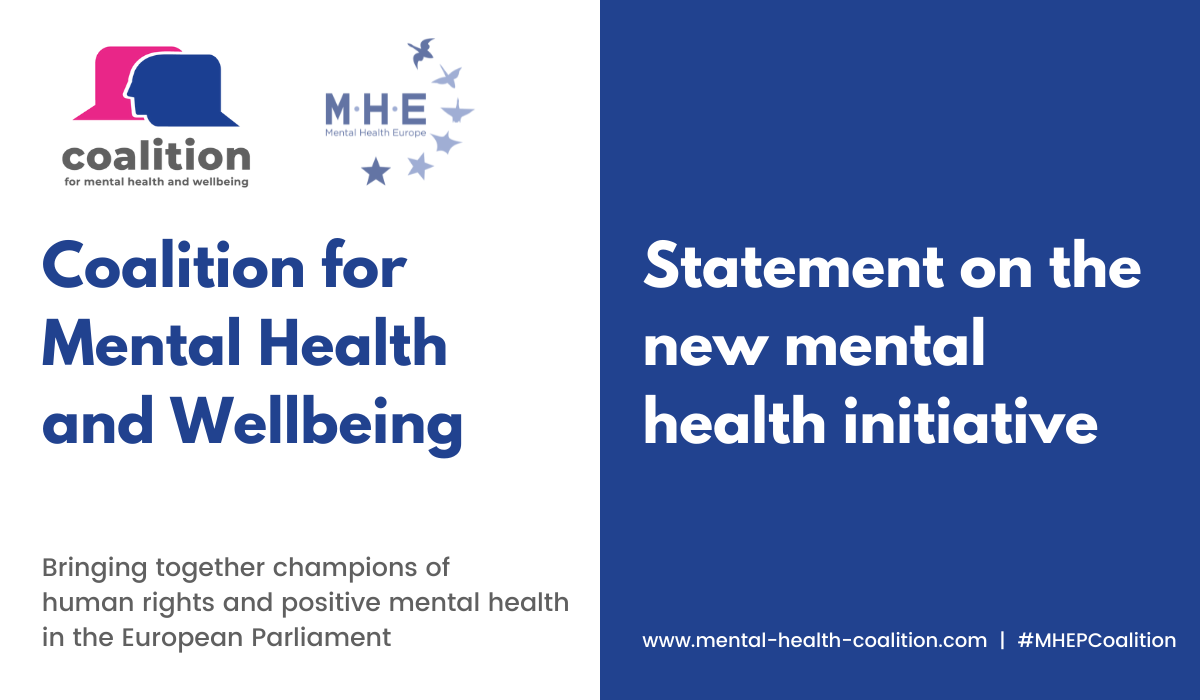Statement on the new mental health initiative by the European Parliament Coalition on Mental Health and Wellbeing

Brussels, 31 October 2022 – The European Parliament Coalition for Mental Health and Wellbeing appreciates the commitment to bring forward EU policies and actions on mental health and calls on the European Commission to utilise this moment to ensure transformational change on mental health.
During her State of the Union address, European Commission President von der Leyen announced there would be a mental health initiative in the coming year, as a result of the Conference on the Future of Europe – an EU wide participative democracy exercise that offered European citizens the opportunity to put forward their views about the type of EU they wished to see develop in the years ahead.
A month after the announcement, Members of the European Parliament (MEPs) gathered in Strasbourg on 18 October 2022 to hold a debate on the topic, which included an exchange with Commissioner Kyriakides, as representative from the European Commission, and Ivan Bartoš, speaking on behalf of the Council of the European Union and its Czech Presidency, speaking on behalf of the Council of the European Union and its Czech Presidency.
Commissioner Kyriakides emphasised the need to address mental health in a comprehensive way, including at home, schools, work and in the health system. She stressed that investing in mental health is an investment in our people, our economies, and our societies. That same day, the European Commission Work Plan for 2023 was adopted, which reaffirmed the Commission’s intention to deliver a non-legislative comprehensive approach to mental health.
During the debate, several MEPs from the European Parliament and the Coalition for Mental Health and Wellbeing took the floor to call for concrete action on mental health. This included calling for a European Mental Health Strategy to ensure long-term, comprehensive and coordinated action on the topic. MEPs also spoke about the impact that the COVID-19 pandemic, the war in Ukraine and the energy crisis have had and are having on the mental well-being of individuals and about the fact that certain groups (e.g., young and older people, LGBTQ+ community) are more at risk of mental ill-health and marginalisation.
While it is often argued that mental health is not a competence of the European Union, we can certainly do better. EU policies, such as social, disability, migratory and human rights policies directly impact the mental health and wellbeing of millions of people in Europe, including persons with mental health problems and psychosocial disabilities.
The European Parliament Coalition on Mental Health and Wellbeing calls on the European Commission to:
- Introduce an EU Strategy on Mental Health with precise recommendations to the Member States, that incorporates robust governance, legislative initiatives (e.g., in the field of mental health at work) and appropriate financing;
- Ensure cross-functional collaboration between Directorates-General (DGs). A comprehensive mental health initiative should foresee the inclusion of mental health in all policies, target all groups including children and young people;
- Consider the impact of different policies on mental health, such as digital policy and the influence of the internet and social networks on mental health, especially in children and young people;
- Strengthen policies that are key to the welfare state such as employment, education, housing, health and the environment;
- Take a psychosocial approach to address intersectionality and the socio-economic determinants of mental health. The psychosocial model of mental health should be used as a guiding principle to inform the Commission’s work on mental health;
- Ensure meaningful involvement and cooperation with people with lived experience of mental health problems and civil society organisations. This means fostering equality-based collaborations involving experts by experience, their family members, supporters, communities, and service providers;
- Promote non-coercive, rights-based and person-centred mental health services and care, de-institutionalisation and the respect for legal capacity, required of the EU as a State Party to the UN Convention on the Rights of Persons with Disabilities (UN CRPD);
- Support EU member states to propel work on mental health, including national action plans on mental health and adopting policies that support the prevention of mental health issues;
- Include comprehensive objectives with clear benchmarks and indicators, as well as an adequate budget allocated for its implementation.
Without urgent action, the rise of psychosocial support demands will continue to increase, and the mental health impacts of unprecedented situations such as the pandemic, war in Ukraine, climate and cost-of-living crisis, will be long-term and pervasive.
As EU institutions begin the process to launch the initiative next summer, the European Parliament Coalition on Mental Health and Wellbeing is dedicated to collaborating with the European Commission, the Council of the EU, fellow Members of the European Parliament and other stakeholders. We must ensure that adequate, rights-based and person-centred mental health care and support is a reality for all.
We have this opportunity – let’s not waste it!
###
About the Coalition for Mental Health and Wellbeing
Established in 2012 by Mental health Europe, the Coalition for Mental Health and Wellbeing in the European Parliament is a platform of like-minded MEPs championing positive mental health and human rights and advocating for a coordinated response to address the most pressing determinants of mental health.
For more information, visit www.mental-health-coalition.com.
About Mental Health Europe
Mental Health Europe (MHE) is the largest independent European network organisation working to promote positive mental health prevent mental health problems and advance the rights of people with mental ill-health or psychosocial disabilities. Learn more about MHE from this video.
Contact
For more information, please contact Fatima Awil (fatima.awil@mentalhealtheurope.org), Policy & Knowledge Officer at Mental Health Europe.
Let's meet co-chairs of the Coalition
Stay connected
Get our latest news, personal stories, research articles, and job opportunities.